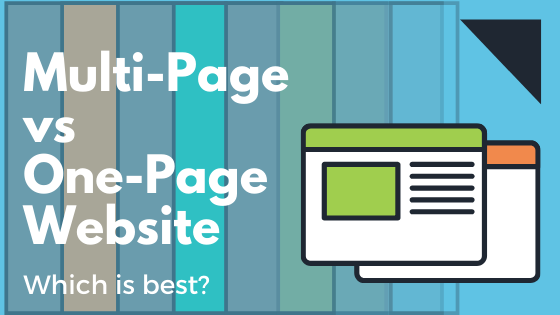
So the most commonly asked question I get regarding web design is “I just need, like, one page right?”. The answer is NO. While a one page website is better than no website, it is definitely not ideal. You need to have multiple pages, each with a minimum of 500 words. The reason for this is that you want to give search engines as much as possible to index and therefore rank you with. The average website consists of about five pages: Home, About, Contact, Services/Shop, and Blog.
Should I have a one page website?
A one page website has some benefits, such as being easy to update, easy to navigate, and simple to load. However, it’s only going to be between 500-1,000 words on average. This means that you’ll have a lot of keywords about what you do without having a lot of supporting copy.
Your whole goal of having a website is to be found. If you’re not giving Google much to work with, it simply won’t show you high enough in the search results to be found. A web page should have a minimum of 500 words, but if you only have a one page website, it definitely needs to be higher. The downside is that the longer a page is the more likely a customer is going to click away and hurt your SEO stats that way.
A one page website is harder to have rank on Google due to not having a clear topic of the page. You’d be putting information about many different topics all on one page without much indication about what the page as a whole is about. There are ways to have a one page website without the drawback of confusing search engines when it comes to the topic. You can use clear, high level (level 2 max!) headings that indicate a change of topic, you can use separators, different colored backgrounds and more.
Should I have more than one website page?
Having a multi-page website increases your overall word count and allows you to target specific keywords with providing supporting copy. Multiple website pages also help visitors get to what they’re looking for fast. You should have a minimum of 500 words on each of these pages. A good rule of thumb is to make each topic it’s own page.
For example, you’ll see that I have an individual page for each service that I provide. This allows my visitors to find specific information regarding each service such as prices and a breakdown of why the service is important, benefits, and what’s included in each package.
Doing this also naturally allows you to use the keyword as many times as possible. Meaning you’re not having to worry about whether or not you’ve used the keyword enough. Other technical SEO techniques for keyword ranking is using the keyword in
- The Title of the Page
- The Meta Description of the Page
- In the first sentence of the post
- In at least 2-3 subheadings throughout the page.
- As many times in the body of the page as possible, naturally.
A multiple page website allows you to optimize for keywords a lot more efficiently and effectively. Other benefits of a multiple page website that a one page website doesn’t have include:
- Greater ease of linking from other platforms
- Ability to keep visitors focused on what they’re looking for without overwhelming them.
- Blog to keep readers up to date
So what’s better, a one-page or multi-page website?
From an SEO standpoint, a multipage website is much better than a one-page website. It gives search engines clearly defined pages which will capture more of the search result listings that are relevant to your keywords, help users find what they’re looking for quickly, and provide a greater variety of links when posting in your social media. A one-page website is better than no website however, but you should plan to invest in a larger website as soon as possible.
Looking for a web designer? Look no further! We offer amazing quality at amazing prices and are ready to work with you to get your business online and have it thrive online. Check out our portfolio here!

